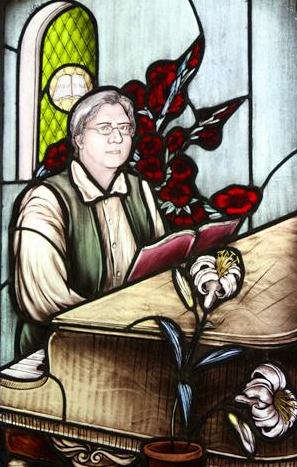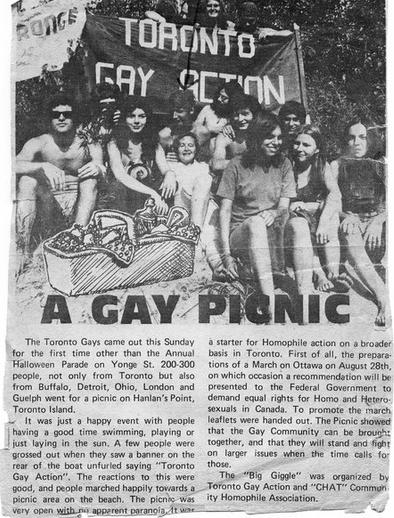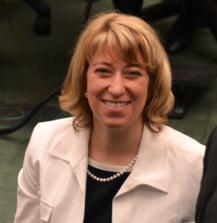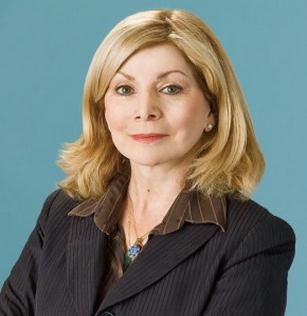
A stained-glass window commemorates Toby Dancer. Credit: Xtra file photo

An old clipping featuring Cheri DiNovo on Aug 1, 1971, at Toronto's first public gay pride demonstration. Credit: James Dubro

Liberal Education Minister Laurel Broten celebrates Bill 13's moving to third reading at Queen's Park June 4. Credit: Andrea Houston (file photo)
NDP MPP Cheri DiNovo and Liberal Education Minister Laurel Broten have been selected as the 2012 co-grand marshals of Toronto Pride for their work championing two important pieces of legislation that affect Ontario’s queer community.
With the passage of Bill 13, the Liberals’ Accepting Schools Act, on June 5, and Toby’s Act, on June 13, Ontario took a progressive step forward. The bills will ensure safer schools for queer youth and the inclusion of gender identity and gender expression in the Ontario Human Rights Code (OHRC).
These are not small advances, says Pride co-chair Luka Amona, adding that queer issues, such as gay-straight alliances (GSAs) and trans rights, have been at the forefront of public debate all year.
Pushed by the activism of students and trans leaders, the two politicians helped ensure new laws were created to bring about change in the province. “So it seemed appropriate to put the spotlight on two major victories,” Amona says.
DiNovo, who tabled Toby’s Act four times, is enjoying the hard-fought victory.
She calls the title of Pride co-grand marshal “a great honour,” saying she considers it a culmination of her lifelong commitment to queer rights.
In 1971 DiNovo was one of two people to sign what became Canada’s first gay liberation manifesto, We Demand. “I’ve been on the scene a long, long time,” she says. “I was the only woman who signed the document, and then went to Ottawa to demand, what we called then, gay rights.”
Since she first introduced Toby’s Act as a private member’s bill in 2007, DiNovo has been focused on amending the OHRC to include rights for trans people and ensure protection in the Criminal Code. That took a lot of education, she says. “Having access to cabinet ministers and members of all political stripes has been a chance to talk it up for years. So finally it gets through . . . It was never ‘will we win?’ It was ‘when?’”
The touching story of the bill’s namesake, Toby Dancer, is one DiNovo has told in the legislature countless times. She met Dancer when she was a United Church minister. Dancer was a trans member of her congregation whose death galvanized her commitment to trans rights. At the church, Dancer is commemorated in a stained-glass window.
The current minority government in Ontario forced all parties to work together, allowing Toby’s Act, which had all-party support, to “pass like slicing through butter,” she says.
“I’ve always been a person at Queen’s Park who thought the parties should work together, even before we had a minority government,” she says. “Toby’s Act was a true collaborative effort.”
Bill 13 was quite the opposite, she says, calling the partisan bickering and religious in-fighting around the bill “a nightmare.”
Along with NDP education critic Peter Tabuns, DiNovo played a key role in the passage of Bill 13. It was the final push by the NDP that led to an amendment ensuring students, not Catholic administrators, are able to choose the name of support groups.
Broten also credits collaboration and an effective minority government for the bills’ passage. She says that when Bill 13 stalled and pressure mounted from Conservative politicians, Catholic trustees and constituents, the situation looked grim. In the end, she says, she “put kids first.”
“[The Liberals and NDP] put partisan differences aside to put kids and human rights first,” she says. “That’s community coming together to support diversity and support each other. And from my perspective, that’s what Pride’s about.”
Broten says she is very honoured to be chosen as a co-grand marshal and is looking forward to the parade, especially to meeting the hundreds of GSA students marching in the youth contingent.
“This is recognition for me that I am part of a government that has brought forward Bill 13,” she says. “I hope that what it tells every student is that we stand beside them, we love you and we want to support you to be who you are. I think that is the most important message we can deliver to our young people in this province, and it’s one that I’m really excited about.”
The LGBT Youth Line has been named Pride’s honoured group. Melissa Deleary, interim executive director, says she’s very excited and honoured to be recognized.
Looking back on a year of student activism around the issue of GSAs, Deleary says she’s proud to see youth standing up and demanding their rights.
“Youth are playing an active role in making positive changes and changing public perception,” she says. “We’re no longer telling youth what they need; they are telling us what they need. They are making their voices heard. That’s wonderful to see.”
This is the first time the Youth Line has received the honour. The group, which has been offering peer-support counselling to at-risk queer youth for 17 years, gets about 6,000 calls from youth each year, she says.
The Youth Line has a staff of five, plus about 50 youth volunteers. “Those volunteers are queer-identified youth ages 15 to 26. They are just phenomenal folks. They are the ones who answer all the calls. We could not run the organization without them.”
When youth call the help line, they speak directly to someone who has had a similar experience, Deleary says. “There’s such a wide range of calls that we receive. Calls about coming out, questioning, bullying, relationships, family. Peers are coming from a place of understanding.”
Occasionally, Youth Line staff get feedback from people who were helped by the service, she says. “We meet people who were helped at really critical points in their lives and development in their gender and sexual identity. And that’s really positive to hear they were really happy to have had that support at that time.”
Click here for a photo gallery of the Pride launch party.

 Why you can trust Xtra
Why you can trust Xtra


